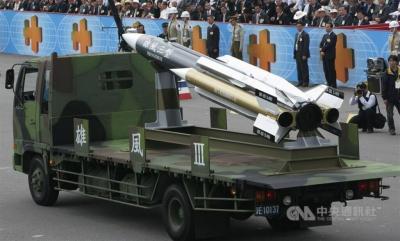Level 3 COVID-19 restrictions have had a severe impact on many sectors, but none are facing a greater crisis than social welfare organizations, which are struggling to operate without steady donations and orders.
Taipei residents with Down syndrome usually have the choice of more than 50 workshops where they can learn skills and receive guidance from professional instructors.
However, many of the workshops were forced to close last month due to a COVID-19 outbreak, leaving families to worry about the safety of their loved ones.
Some parents have to care for their special needs children while simultaneously working from home, leaving them exhausted.
Social organizations play an important role in helping stabilize families, Down Syndrome Foundation chairman Lin Cheng-hsia (林正俠) said yesterday.
“However, we have to face the fact that we are also affected by the pandemic,” he added.
Fundraising figures were down 35 percent year-on-year last month, foundation data showed.
More than 1,000 orders for its popular snack boxes were lost due to cancelations during the Dragon Boat Festival long weekend and because of delayed weddings, causing losses of up to NT$1 million (US$36,191), the foundation said.
Sales of a pandemic snack box made especially for people working from home are also lagging, it added.
Handmade biscuits in the boxes are to expire soon, the foundation said, urging people to order online or offer cash support through donation boxes at supermarkets.
The Yu-Cheng Social Welfare Foundation also sent out a call for help amid lackluster orders.
Its workshops in Taipei have restaurants, car washes, bakeries, printers and other services run by people with Down syndrome, all of which have been affected by the pandemic.
With graduation ceremonies and awards ceremonies canceled, the foundation said it has lost nearly all of its bakery and printing orders this month.
Demand at its car washes is also dramatically down as people remain at home, it said.
Work hours have been reduced to allow employees to return home earlier, the foundation added.
Income from its business ventures and donations are at about one-third of what they were at this time last year, the foundation said.
Only the Organic Yam restaurant and grocery store under the Jianguo Road overpass is keeping the foundation afloat by selling lunchboxes, it added, encouraging the public to donate online.
The Taipei Foreign and Disabled Labor Office promised to promote the foundations once the pandemic situation improves.
Office Director Yeh Hsiu-shan (葉琇珊) confirmed the difficulties that social enterprises are facing amid level 3 closures and an economic contraction.
Basically the only sector that has remained unimpeded is sanitation, she said.
However, the Taipei Department of Labor is planning to promote social enterprises in the second half of this year, pending improvement of the COVID-19 situation, she said, encouraging people to give generously when the time comes.
The office is also considering increasing purchases among the public sector to help the enterprises make it through this challenging time, she added.

STATS: Taiwan’s average life expectancy of 80.77 years was lower than that of Japan, Singapore and South Korea, but higher than in China, Malaysia and Indonesia Taiwan’s average life expectancy last year increased to 80.77 years, but was still not back to its pre-COVID-19 pandemic peak of 81.32 years in 2020, the Ministry of the Interior said yesterday. The average life expectancy last year increased the 0.54 years from 2023, the ministry said in a statement. For men and women, the average life expectancy last year was 77.42 years and 84.30 years respectively, up 0.48 years and 0.56 years from the previous year. Taiwan’s average life expectancy peaked at 81.32 years in 2020, as the nation was relatively unaffected by the pandemic that year. The metric

Taiwan High Speed Rail Corp. (THSRC) plans to ease strained capacity during peak hours by introducing new fare rules restricting passengers traveling without reserved seats in 2026, company Chairman Shih Che (史哲) said Wednesday. THSRC needs to tackle its capacity issue because there have been several occasions where passengers holding tickets with reserved seats did not make it onto their train in stations packed with individuals traveling without a reserved seat, Shih told reporters in a joint interview in Taipei. Non-reserved seats allow travelers maximum flexibility, but it has led to issues relating to quality of service and safety concerns, especially during

A magnitude 5.1 earthquake struck Chiayi County at 4:37pm today, the Central Weather Administration (CWA) said. The hypocenter was 36.3km southeast of Chiayi County Hall at a depth of 10.4km, CWA data showed. There were no immediate reports of damage resulting from the quake. The intensity of the quake, which gauges the actual effect of a seismic event, measured 4 in Chiayi County, Tainan and Kaohsiung on Taiwan's seven-tier intensity scale, the data showed. The quake had an intensity of 3 in Chiayi City and Yunlin County, while it was measured as 2 in Pingtung, Taitung, Hualien, Changhua, Nantou and Penghu counties, the data

The Supreme Court today rejected an appeal filed by former Air Force officer Shih Chun-cheng (史濬程), convicted of Chinese Communist Party (CCP) espionage, finalizing his sentence at two years and two months for contravening the National Security Act (國家安全法). His other ruling, a ten-month sentence for an additional contravention, was meanwhile overturned and sent to the Taichung branch of the High Court for retrial, the Supreme Court said today. Prosecutors have been notified as Shih is considered a flight risk. Shih was recruited by Chinese Communist Party (CCP) intelligence officials after his retirement in 2008 and appointed as a supervisor